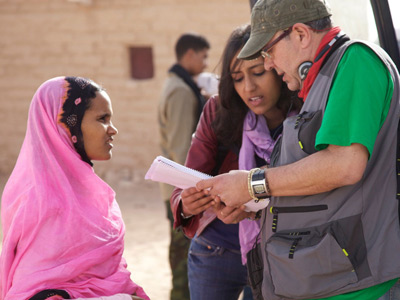African cinema under the spotlight in Abu Dhabi
In Abu Dhabi International Film Festival not only North African films are celebrated because they have an Arab cultural connection, but also South Africans do have a chance to be awarded. This is what the fifth edition held from October 13th to 22nd showed this year.
Last October 21st, two winners of this big Arab film venue were South Africans. Jayashree Basavaraj was awarded the price of the Best Actress ($20,000) for her performance in n Lucky, directed by Avie Luthra. While Skeem by Tim Greene got the Audience Choice Award, a modicum sum of ($50,000).
The first price is not surprising. It was given by a jury made of professionals. The second is really unexpected. The public of Emirates is not especially familiar with African stories. Not to mention that the audience in this festival is mainly made of festival guests and foreigners
The most probable explanation of this price is the existence of a big Indian community in this Arab country. The South African actress, who is from Indian origins, should have had a particular attraction on the Indian public who attended the screening.
Out of this surprising success of South African films, the northern ones were not so lucky. Except Asmaa by Egyptian Amr Salama who left with a nice amount of three awards: Best Director from the Arab World, Best Actor, et Best Producer.
It was not the case of Tunisian participation. Only veteran Ridha Bahi got the price of best producer for his film, Always Brando. The Moroccan also got only one price. It was the one of the best director in the international competition.
The Moroccan participants were deeply disappointed. Not only because one single price is not enough for an emergent film industry but also for political reasons. They contested the price of best actress attributed to Memona Mohamed in Tears of Sand directed by Pedro Pérez Rosado from Spain.
The reason is that the actress is from the Western Sahara and the film is shot in the camps of Tindouf in Algeria. It tells the story of a woman who is not allowed to visit her family in the camps neither in the territory of the Sahara which is under the Moroccan control.
Couple of days earlier, the delegation threatened the organization of a collective withdrawing if the film is not put out of the festival. The Moroccan participation is most important Arab one this year. It is made of five features, few shorts and many journalists. Ismail Ferroukhi was awarded the price of the Best Director ($50,000) for his film called Free Men.
Moroccans found that the purpose of the film is against the interest of their country. Showing the bad conditions of the life in the refugee camp in the desert of Algeria and absurd statu quo situation of a whole society, the film is pamphlet against the Moroccan policy in the region. It was then unacceptable that in addition to that, the actress gets any price.
It seems that the organization of the festival had accepted the objection of the delegation, but the jury had another point of view. By sticking to its sovereignty, it expresses the wish not let politics decide for cinema.
From The South, 27 oct 2011



